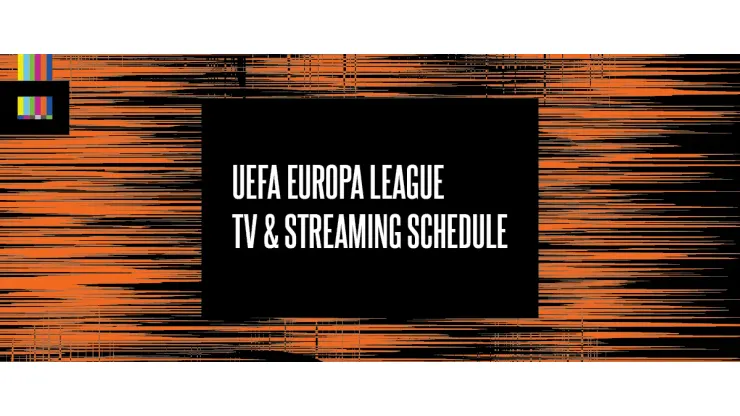We’re your No. 1 source for the UEFA Europa League schedule for fans in the USA.
In the United States, CBS Sports have the exclusive English-language rights to broadcast the UEFA Europa League until the end of the 2029/30 season. In total, it’ll be more than four full seasons of coverage from the Group Stage all the way to the league finals every year.
Watch Europa League on Paramount+:
Our Pick:Includes: Champions League, Europa League, Serie A, NWSL, Argentine Primera, Brasileirão, Scottish Premiership, Women's Super League, & More |
|
Spanish-language rights for the UEFA club competition have been acquired by Univision Deportes (TUDN), which will run until the end of the 2026/27 season.
Europa League TV schedule
All times Eastern USA
Thursday, May 02
- 03:00 PM ET
Marseille vs. Atalanta (UEFA Europa League)
- Paramount+,
- Paramount+,
- ViX
- ViX
- 03:00 PM ET
AS Roma vs. Bayer Leverkusen (UEFA Europa League)
- Paramount+,
- Paramount+,
- CBS Sports Network,
- CBS Sports Network,
- UniMás,
- UniMás,
- TUDN,
- TUDN,
- Fubo,
- Fubo,
- DirecTV Stream,
- DirecTV Stream,
- ViX
- ViX
- 03:00 PM ET
Thursday, May 09
- 03:00 PM ET
Bayer Leverkusen vs. AS Roma (UEFA Europa League)
- Paramount+,
- Paramount+,
- ViX
- ViX
- 03:00 PM ET
Atalanta vs. Marseille (UEFA Europa League)
- Paramount+,
- Paramount+,
- ViX
- ViX
- 03:00 PM ET
For the Europa League, every single game will be streamed exclusively through the streaming service Paramount+, which offers a 7-day free trial. Read our Paramount+ FAQ for more info. Select TV games will air on CBS and/or CBS Sports Network.
A viable alternative is to consider watching Europa League games on Univision where many of the games will be shown on television in Spanish, which are streamed via Fubo.
Annual Europa League Schedule
Preliminary rounds begin in July while playoff rounds of the tournament are in August. The group stages of the competition are played from September through December. Round of 16 games are played during February-March, quarter-finals in April, semi-finals in late April and May, while the final is at the end of May.
Europa League History
After the Inter-Cities Fairs Cup was discontinued in 1971–72, the Europa League – then called the UEFA Cup – was established. Popular during its time, the Fairs Cup was a tournament available to teams from cities that held trade fairs.
The competition became more difficult to manage as the number of teams competing increased, therefore UEFA opted to substitute the UEFA Cup. The event quickly gained a reputation for being very competitive as its popularity soared over the years. In order to keep fans interested, the UEFA Europa League changed its structure many times.
In the past, only the domestic league runners-up were eligible to participate. However, in 1999, it was combined with the UEFA Cup Winners’ Cup, UEFA’s former inferior European tournament.
Since then, the UEFA Cup has expanded to include the champions of domestic cup tournaments. And those teams that didn’t make it beyond the UEFA Champions League’s third qualifying round could still play in the UEFA Cup.
The same was true for the third-place teams in the UCL group stage. A total of three clubs chosen from the domestic League Cup winners and Fair Play representatives will also be participating.
Format changes and expansion
With more clubs from lower levels taking part, the number of teams competing grew, and the competition’s structure underwent many revisions. A group stage, similar to that of the Champions League, was added to the competition in 2004–05 as it grew to include more clubs.
Because of this change, not only was the level of competition raised, but lesser teams were given an equal opportunity to play in the European grand arena.
Becoming the ‘UEFA Europa League’
Its current name, the UEFA Europa League, dates back to the 2009–10 championship. Also at this period, the new Europa League replaced the UEFA Intertoto Cup, the third-tier tournament run by UEFA.
The current format calls for qualifying and a play-off to set the scene for the group stage at the beginning of September. Currently, there are 48 teams competing in the group stage. The teams who finish first and second in their respective groups will advance to the knockout round.
Except for the final, every round of elimination is a two-legged tie, much as in the Champions League. A year after the tournament ends, the victorious team returns the trophy to UEFA. When the trophy is returned, the club will be allowed to retain a miniature version of it.
Europa League: 21st century and modern history
Over the years, the UEFA Europa League has played host to many memorable finals. Amazing comebacks and nail-biting finals have left a lasting impression on football fans from the tournament. As an example, consider Liverpool‘s 2000–01 season victory against Alaves, in which they rallied from a 3–1 halftime deficit to win 5–4 in a historically exciting final.
Also unforgettable from the 2020–21 campaign was the nail-biting final between Villarreal and Manchester United, which went to a penalty shootout. In a momentous occasion for the club, Villarreal came out on top, winning their first major European championship.
Winners of the Europa League now get automatic entry to the Champions League group stage, elevating the competition’s profile in recent years. Clubs are much more interested in participating in the tournament now that they may compete against the top teams in Europe.
UEFA Club Competitions
The UEFA Europa League isn’t the only European club competition. UEFA also features the following European football competitions: UEFA Champions League and UEFA Europa Conference League.
Courtesy of World Soccer Talk, download a complimentary copy of The Ultimate Soccer TV And Streaming Guide, which features details on where to watch all of the leagues from around the world on US TV and streaming.
To find out when soccer games are on, download the free Soccer TV Schedules App which includes listings of all of the live soccer matches available in the United States (available on Apple iOS devices and Android devices).
200+ Channels With Sports & News
- Starting price: $33/mo. for fubo Latino Package
- Watch Premier League, Women’s World Cup, Euro 2024 & Gold Cup
The New Home of MLS
- Price: $14.99/mo. for MLS Season Pass
- Watch every MLS game including playoffs & Leagues Cup
Many Sports & ESPN Originals
- Price: $10.99/mo. (or get ESPN+, Hulu & Disney+ for $14.99/mo.)
- Features Bundesliga, LaLiga, Championship, & FA Cup
2,000+ soccer games per year
- Price: $5.99/mo
- Features Champions League, Serie A, Europa League & Brasileirāo
175 Premier League Games & PL TV
- Starting price: $5.99/mo. for Peacock Premium
- Watch 175 exclusive EPL games per season








